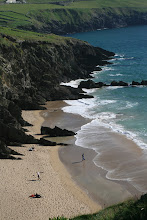 Brothers of two Bloody Sunday victims joined the Bay Ridge Irish American Action Association for the last Bloody Sunday Memorial Mass and March in Brooklyn on Feb. 13.
Brothers of two Bloody Sunday victims joined the Bay Ridge Irish American Action Association for the last Bloody Sunday Memorial Mass and March in Brooklyn on Feb. 13.This was their 39th annual memorial of the January 30, 1972, unprovoked killing of 14 unarmed Irish civil rights marchers by the British Army’s Parachute Regiment in Derry, in the North of Ireland.
Jack Kelly and Gerry Duddy, founding members of the Bloody Sunday Justice Campaign, came from Derry to join marchers through the streets of Sunset Park to Our Lady of Perpetual Help Basilica for 1:15 p.m. Mass.
Marchers carried white crosses with the names of Michael Kelly, Jack Duddy, William McKinney, Patrick Doherty, Bernard McGuigan, Gerald McKinney, William Nash, James Wray, Michael McDaid, Gerald Donaghy, John Johnston, Kevin McElhinney, John Young and Hugh Gilmore.
The Clann Eireann Pipe Band led the march from the Irish Haven on Fourth Ave. Father Francis Mulvaney, C.Ss.R., of O.L.P.H. walked along with longtime memorial organizers Mary Nolan, Mary Lennon and Martin Brennan.
Before Mass at O.L.P.H., Jack Kelly, brother of Michael Kelly, described what it was like for families of Bloody Sunday victims last June 15 with the release of the long-awaited Saville Report, which vindicated the victims as “innocent.”
The report acknowledged: no warning was issued to the thousands who marched that day; contrary to their claims, the British Army was not responding to gun attacks or stone throwing; many died while helping other wounded marchers; and the British Army lied and covered up its actions of January 30, 1972.
Kelly thanked the faithful in Brooklyn for their “support of the Bloody Sunday families” through the years. After 38 ½ years of waiting, Kelly said, “the admittance of the truth was one of the greatest moments of my life.” The seven years waiting for the publication of the Saville Report was frustrating, he said. The last witness had been heard in 2004. The report took 5 ½ years to write compared to three months for the original Widgery Tribunal report, a whitewash of the events of Bloody Sunday.
On June 15, two members from each family entered Derry’s Guildhall at 10:30 a.m., where they were given the opportunity to read the Saville Report, which finally acknowledged their relatives were innocent.
“We took on the might of the British establishment and won,” Kelly said. “What we have always known was acknowledged.” Kelly did note there was still the matter of acknowledging that the RUC had planted nail bombs in the pockets of victim Gerald Donaghy. “The Saville Report still left this lie,” he said.
Nevertheless, the release of the report prompted British Prime Minister David Cameron that day to call the shootings “both unjustified and unjustifiable.”
Cameron admitted in a British House of Commons statement, “What happened should never, ever have happened. The families of those who died should not have had to live with the pain and hurt of that day, and a lifetime of loss. Some members of our armed forces acted wrongly. The government is ultimately responsible for the conduct of the armed forces. And for that, on behalf of the government – and indeed our country – I am deeply sorry.”
“It was a brilliant day, a day I will never forget,” Kelly said.
Two weeks ago, Derry held its own last Memorial March, with 30,000 participating, Kelly said. “We will still have a Memorial Mass,” he said. “We will still continue commemorating the memory of our loved ones.”
Father Colm Campbell, founder of the New York Irish Center, concelebrated Mass with Father Mulvaney. The Bloody Sunday victims had “lived the Gospel of hungering and thirsting for justice,” Father Campbell said in his homily. He commended the families who through “39 frustrating years of seeking justice, never gave up.”
As each of the 14 names was called out during the prayers of the faithful, Gerry Duddy, brother of Jackie Duddy, echoed in a strong, loud voice, “Innocent.”

No comments:
Post a Comment